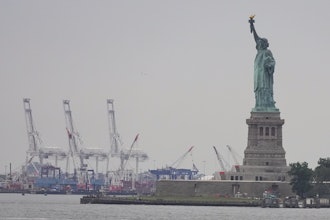
JUNEAU, Alaska (AP) — The Willow oil project on Alaska's petroleum-rich North Slope is part of a "new era" of large-scale development in the region but it isn't a sure thing, with litigation and costs among the factors that stand as potential impediments, a state official told lawmakers Thursday.
John Crowther, deputy commissioner of the Alaska Department of Natural Resources, said the scale of projects like Willow, which is on federal lands in the National Petroleum Reserve-Alaska and was approved by the Biden administration last week, is "tremendous" and would benefit Alaska. He also lumped in as significant the Pikka oil project, which is on state lands east of the petroleum reserve.
But he also said multibillion-dollar, multi-year projects are complex and there is "significant runway" for the ConocoPhillips Alaska-backed Willow project to get to the development and production stages. Australia-based Santos is working with Repsol to advance the Pikka project.
State tax officials on Thursday provided lawmakers an analysis of potential revenue impacts and benefits from Willow for the state treasury but noted uncertainty around the estimates, including when the project ultimately might begin, oil price volatility and industry costs.
North Slope oil prices, which were around $115 a barrel this time last year amid Russia's invasion of Ukraine, are currently in the $70-per-barrel range.
Dan Stickel, chief economist with the state Department of Revenue's tax division, told the Senate Finance Committee the oil and gas industry is a high-risk industry that requires considerable capital. He said the ability for companies to recover costs is a key consideration when they decide whether to invest, and that Alaska's tax structure has elements that support cost recovery. For example, the tax system allows for deductions related to investments and incentives for new production areas.
The state tax division's modeling indicated Willow could lead to billions of dollars in revenue for the state, North Slope communities, federal government and the company over the project's life, said Owen Stephens, a tax division analyst.
Oil has long been the state's economic lifeblood. Alaska political leaders — including Republican Gov. Mike Dunleavy, the state's bipartisan congressional delegation and the Legislature — have pushed for Willow, in part seeing it as a way to boost the flow of oil through the trans-Alaska pipeline. Many leaders on the remote North Slope or with ties to the region have cast the project as economically vital for their communities. Unions have also spoken in support.
Environmentalists, however, have argued the project is at odds with President Joe Biden's climate pledges and worry it could lead to further development in the region.
Environmental organizations and an Alaska Native group have filed lawsuits challenging Willow's approval, arguing in part that the U.S. Bureau of Land Management failed to consider an adequate range of alternatives. A federal judge is expected to decide by early April whether to halt construction activities related to the project pending resolution of the cases, something the groups are requesting.
The approved project is smaller than what ConocoPhillips Alaska had earlier sought but the company said it welcomed the decision.
Rebecca Boys, a company spokesperson, earlier this week said the company was building ice roads for construction work but agreed to delay gravel mine activities until April 4, unless the judge issues a decision earlier than that denying the injunction requests filed by Willow opponents.
ConocoPhillips Alaska is intervening in the litigation in support of the federal agencies being sued over the approval. Arctic Slope Regional Corp., an Alaska Native regional corporation; the North Slope Borough; Kuukpik Corp., an Alaska Native village corporation and the state have also intervened in support of the approval.
Willow could produce up to 180,000 barrels of oil a day and more than 600 million barrels over its 30-year life, according to the company.






















